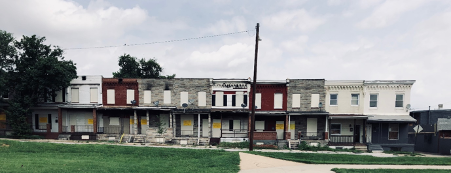Unbelonging: The Politics of Address
Chloe Ahmann
In 1976, the brand-new Maryland Science Center boasted a map of Baltimore that left out Curtis Bay—the city’s southernmost neighbourhood. A few years later, residents griped that the ‘Welcome to Baltimore’ sign was situated north of their community. Even today, locals complain that politicians get lost on their way to meetings in the area. I know the frustration well. When I taught first grade in Curtis Bay, I had trouble getting substitutes. I would call down the school system’s list and each one would say ‘no’, they only worked ‘in the city’.
Curtis Bay is in Baltimore City. It has been since 1919. That year, the city annexed the heavy manufacturing zone from Anne Arundel County against residents’ wishes, in the hopes that absorbing Curtis Bay’s industrial potential would keep Baltimore from losing its ‘top ten’ spot in the national urban ranking. To its newest citizens, Baltimore pledged an extension of municipal services. One hundred years later, many call that pledge the first in a century of empty guarantees: the city comes there last, residents say, to pick up trash and shovel snow. And in a particularly brazen example of neglect, some homes in the area were not hooked up to sewers until the 1970s.
Another example from just three years ago, when a fire erupted on Curtis Bay’s Hazel Street: It took firefighters 30 minutes to arrive and, when they did, they could not pump any water. Residents watched them move from one broken hydrant to another, and another, while ten historic rowhomes were reduced to pieces.

Fig. One. Curtis Bay’s historic Hazel Street, a year after the fire. Photo by Chloe Ahmann.
Curtis Bay is just minutes south of Baltimore’s famed Inner Harbor, across the rickety Hanover Street Bridge and nestled between chemical plants, oil refineries, scrapyards, landfills, an enormous coal-export terminal, a medical waste incinerator, and the city’s wastewater-treatment facility. Bureaucratically, it is part of Baltimore—just check residents’ drivers’ licenses. In most other ways, it feels cut off from the city. Locals will tell you as much: many call it Baltimore’s ‘armpit’, its ‘asshole’. They consider themselves ‘forgotten’ by the ‘powers that be’. Whites with long ties to the region frequently grumble that it has become ‘infested’ with the city’s rejects (and yes, the descriptor is a racist one), including Black families who moved there in greater numbers after Baltimore demolished much of its downtown public housing (Ahmann, 2019).
There was a time they ‘got political about it’, to borrow one resident’s description of an unsuccessful secession attempt. In the 1990s, community groups brought a bill before the City Council that would return the neighbourhood to Anne Arundel County. When that failed, a new movement sprouted up, house by house: people started modifying their addresses to omit ‘Baltimore’. One woman told me that writing ‘Curtis Bay’, instead, was like flipping the bird at the city.
If the modification had been meant to create a bureaucratic headache for Baltimore, one might count it as a failure. The manager of the regional post office reported to the Sun that their sorting system had ‘already been set up to recognise the name of Curtis Bay’ (Mathews, 1998). Likewise, if the modification had been meant to spark some sort of reappraisal of this place—a retrospective recognition of harm done—it didn’t. Nor did it dilute the region’s industrial density. Nor did it change the demographics of the neighbourhood.

Fig. Two. Curtis Bay is still a heavily industrialised place. Photo courtesy of the Sierra Club.
Anthropologists have written about refusal as political practice. The most pertinent examples in this case are refusals of citizenship and recognition, which can be understood in the affirmative as claims to sovereignty (Cox, 2015; McGranahan, 2018; Shange, 2019; Simpson, 2014). What I want to propose in light of Curtis Bay is something slightly different: a non-instrumental, non-prospective, non-aspirational politics of address. This is a gestural politics without pretentions to structural change (Agamben, 2000; Oustinova-Stjepanovic, this collection), futile when judged from the vantage point of municipal governance. Which is, of course, the point. If omitting ‘Baltimore’ was an empty gesture, it was premised on the experience of living in a governmental vacuum. It was, in other words, an argument about the futility of addressing Baltimore City.
To grapple with this non-instrumental politics of address on a broader scale means recognising, first, that an address is not exactly a place. It is a bureaucratic code, a deterritorialised tool of legibility. An address is not soil.1 You can refuse it without going anywhere. In one of his short stories, William Faulkner (1930) writes about an old woman in Mississippi who would not let workers fasten numbers above her door when mail service modernised. And in fact, it was not uncommon for Confederate sympathisers in the American South to refuse ZIP codes (signs of inclusion in the federal government) when they were introduced in the mid-20th century.2 Like the omission of ‘Baltimore’ from one’s return address, these gestures cannot be understood in any simple way as means toward an end (Kelly, this collection).3 They were cantankerous expressions of annoyance: sneers, winks, gripes, collective grumbles. They were not really meant to do anything. But they were no less political for being fruitless. As efforts to cut symbolic ties, embedded within a violent history of white separatism, these acts asserted rifts in an imagined polity.
The other part of this politics, the politics of address, lies in its verb form. To address is to send something in a particular direction, to communicate it to an addressee. There are multiple potential recipients of the message that inheres in refusing a postal address, including other present and prospective refusers. Then there is the location refused (here, Baltimore) and whoever is on the other end of the mail (a relative, creditor, or utility). The politics of address voices unbelonging to these publics—it would like for them to pay attention—but it does not expect them to respond. It is more about the act of disavowal than the prospect of having a grievance actually heard, much less acted on. In this sense, too, it is a gesture of futility. Or at least it is a futile gesture if one locates ‘the political’ in bodies like the City Council. But if one perceives such bodies to be vacuous, the address takes on a hint of irony.
Jacques Rancière (2006) famously argued that politics involves a distribution of the sensible: it conditions how we act, what we say, the things we want. Politics arranges a perceptual regime. In light of Curtis Bay, we might then ask: sensible to whom? Sometimes the same gesture can be futile on one scale and fulsome on another. Judgments of ‘futility’ are therefore not only temporal (as many authors in this collection argue) but also eminently scalar, which should remind us that no political act is ever just one thing. Here, we have a gesture that does nothing to redistribute municipal boundaries—that does not even try—but that does enact an intimate rebellion. In the face of sometimes real and sometimes imagined neglect, this act claims a spiteful agency. Changing one’s address means asserting a version of the world wherein one chooses their own place, despite knowing this choice to be a kind of fiction. Scholars working to disentangle the political from the instrumental should therefore learn from those who live this paradox. It can be both pointless and deeply political to look at a map and roll your eyes and write Curtis Bay on the mail you send to Baltimore City.
Endnotes
- This may account for the awkward relationship that the politics of address has with the politics of autochthony (as described by Geschiere, 2009). In the politics I am describing, landedness becomes a ground on which to self-exclude, rather than a tool for excluding “outsiders” who cannot claim the same primordial belonging. [↩]
- For more on contentious history of ZIP codes, see Clark, 2013. [↩]
- Though a few in Curtis Bay hoped the shift would reduce their insurance premiums (it didn’t). [↩]
References
Agamben G (2000) Means without End: Notes on Politics. Minneapolis: University of Minnesota Press.
Ahmann C (2019) Waste to energy: garbage prospects and subjunctive politics in late-industrial Baltimore. American Ethnologist 46(3): 328–42.
Cox A M (2015) Shapeshifters: Black Girls and the Choreography of Citizenship. Durham: Duke University Press.
Clark A (2013) The tyranny of the ZIP code. The New Republic 7 March.
Faulkner W (1930) A rose for Emily. The Forum 30 April.
Geschiere P (2009). The Perils of Belonging: Autochthony, Citizenship, and Exclusion in Africa and Europe. Chicago: University of Chicago Press.
Mathews J (1998) Separate but unequal Curtis Bay: Members of community feel cut off from city, and are changing addresses to reflect independence. Baltimore Sun, 31 July.
McGranahan C (2018) Refusal as political practice: citizenship, sovereignty, and Tibetan refugee status. American Ethnologist 45(3): 367–79.
Rancière J (2006) The Politics of Aesthetics. Gabriel Rockhill, trans. London: Continuum.
Shange S (2019) Black Girl Ordinary: Flesh, Carcerality, and the Refusal of Ethnography. Transforming Anthropology 27(1): 3–21.
Simpson A (2014) Mohawk Interruptus: Political Life across the Borders of Settler States. Durham: Duke University Press.
Cite As
Chloe Ahmann (2020) Unbelonging: The Politics of Address. Anthropological Theory Commons. url: http://www.at-commons.com/2020/10/16/unbelonging-the-politics-of-address/
About the author(s)
Chloe Ahmann is an Assistant Professor in the Department of Anthropology at Cornell. She studies race, class, and environmental politics in late-industrial Baltimore. Recent work can be found in Cultural Anthropology, American Ethnologist, SAPIENS, and Somatosphere. For more information, visit http://www.chloeahmann.com